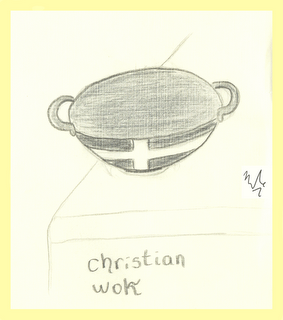
WELCOME TO THE WORLD'S FIRST ON-LINE COMIC LITURGY (since 2003)
Read through the Bible in a year with us following the Life Journal Reading Plan.
The views, comments, statements and opinions expressed on this website do not necessarily represent the official position of The Salvation Army.



So then what about us? What do we do on the day that the ticket man shows up to take our car because we are Christian? What do we do on the day in this city when the mob won’t tolerate the mayor mentioning Christ in counsel here in Swift Current? What do we do when someone walks into our work or our school (like Columbine in the U.S. not too many years ago) asking us if we are Christians and then killing us if we say ‘yes’?
What do we do if we see someone being mocked for going to church? Also, what do we do when we have friends and family visiting us? Do we still say grace when we are entertaining non-believers or are we too embarrassed? Do we publicly ask the blessing when we are at a restaurant? Are we embarrassed to listen to Christian music when someone is in our car? When an acquaintance tells us their problems do we tell them that we will pray for them and then actually pray for them – or not? What do we do? I know more and more people in our country are shrinking back and even politicians that claim to be Christians openly say that they don’t let that affect their work though. (As if that were possible: Your beliefs always determine your actions. If Christian belief isn’t determining our actions, then I would guess that we are not Christian.) I know that when I am at the restaurant I don’t see a lot of people bowing their heads in prayer. I know that there are many friends of mine who – if they ever even go to church – they don’t if they have company or have something else to do on Sunday.
read more: http://sheepspeaks.blogspot.com/2009/11/hebrews-1039-we-will-not-shrink-back.html
The Salvation Army Swift Current Today
The Salvation Army was founded in 1865 – 2 years before Canada was founded as a nation. It was started in a very poor part of England to help people in need. One of our early slogans was ‘Soup, Soap, and Salvation’. The idea was that we could help people with food both physical and even more importantly spiritual. The Salvation Army came to Canada shortly afterwards and we have been in Swift Current here for nearly 100 years now. 2013 will be our 100th anniversary. In Swift Current, God uses The Salvation Army to help people out in a number of different ways:
Free Legal Clinic: If someone needs to contact a lawyer but doesn’t have the money to pay for one, we can help
A Friend in Court: if someone has to go to court either because they have been arrested or if they just have to testify, to tell the judge something, it can be very scary and we can help.
Alternative Measures for Youth: If someone is charged with a crime that they have committed, if they are convicted in court sometimes they aren’t allowed to get a job or go to other countries but we can help them not get a criminal record. What happens here is the people come and sit down with the victim, the person that they wronged, admit what they did was wrong, say they were sorry and the victim and they together come up with what the consequences should be. If the person completes the conditions, then they don’t have a criminal record.
Pregnant or a New Parent? Sometimes people get pregnant by accident, don’t know what to do when they are pregnant or just needs some extra support when this happens, we can help. We offer support for teens who are new parents and who are expecting to become parents.
For Kids: Floor Hockey: Youth between the ages are welcome to join us for a game of pick-up floor hockey, Fridays from 7:30-9:00 p.m. It is a good way to keep young people off the streets. Band: If you would like to learn to play an instrument and/or join our band, please leave a message for Captain Susan at 778-0515. Kids Club: 5-12 year-olds can join us for games, crafts, and other activates on Thursdays after school (3:30-5:00 p.m.).
Thrift Store: We have quality pre-owed items for discounted prices. Any of us at sometime could certainly find ourselves in a position of need. This is a key way that we pay for all of our ministries in town is by selling things at out Thrift Store but items here are priced low enough that pretty much anyone should be able to afford anything they really need. If a person even still can’t afford something we will provide a voucher for them. Also no organization ever needs to store furniture or other large items for that matter – it is even beneficial to our community if they don’t – because we have the space to keep it and can track it to make sure that it goes to people who are in legitimate need.
Emergency Relief Work: If there is a fire or a flood we are part of the relief effort in town. We provide a reception centre and Captain Michael Ramsay has been trained in teaching EDS courses and has assisted in international crises, especially with emotional and spiritual care and debriefing of personnel. I am also involved with both the fire department and the RCMP as their chaplain for when difficult situations arise.
The Food Bank: We are blessed in Swift Current to only have one food bank it means that we can actually be a part of the solution. In communities where there is more than one food bank sometimes they can trap people in poverty. We always ask the question, ‘why are you here?’ when someone shows up at our food bank. We try to identify the root cause and then address that. For example, if someone has budgeting difficulties, we will help them make a workable budget, if someone has alcohol addiction problems we will go and sit with them at an Alcoholics Anonymous meeting, if someone has a gambling problem we can go with them down to the casino so they can sign a voluntary exclusionary agreement – this is a promise that they won’t gamble anymore for a time. It is very important to us that we are a part of the solution rather than a part of the problem. Shortly after I arrived in town here, we had the opportunity to help one fellow. I arrived at work a little while later and he was waiting outside when we were closed. He asked to see our Christian social worker. I told him we were closed. He just asked me to pass on a message to her. When he arrived in town he had nothing, The Salvation Army helped him and now he has work clothes, a job and a place to live. He just want to say, thank you. There are many stories like this and it is a great blessing to hear them.
Spiritual Component: This is a very important aspect of our ministry. The Salvation Army exists to share the love of Jesus Christ, meet human needs and be a transforming influence in the communities of our world. Like I mentioned, we are chaplains for a number of organizations in town including the fire department, rural RCMP, and the Legion. We also have church services on Sundays and regular Bible studies. In The Salvation Army we really do try to serve God by looking after the mind, body, and soul of those in need in our community.
Swift Current Salvation Army at Christmastime is VERY busy. We have all of the church services, band concerts and other activities of the other local churches but we also work very hard to make Christmas very special for everyone in the community, particularly those in need at Christmastime.
We have our Angel Tree (gifts accepted until Dec.15). If you go to the miracle room in the Wheatland Mall right next door to the bookstore, we have our angel tree there. What this is: it is for kids who may not have any toys or presents on Christmas. You can take an angel off the tree. It will have the age of a child on it and whether they are a boy or a girl as well as what they would like for Xmas. You then buy the present and bring it and the angel back unwrapped by the 15th and we will make sure that even these families in need will get something special under the tree
We have our Christmas hampers. These are large packages of Christmas food including turkeys or hams and everything that a family would need to cook a big Christmas dinner plus enough food to get them through the month and gifts and special toys for the kids. People can apply all week this week if they need to. I had one young mom with a new baby a couple of years ago come up to me in tears when she was collecting their hamper and say, ‘Thank-you, without The Salvation Army we wouldn’t have had a Christmas at all.’
Broncos Teddy Bear and Toque Toss is this Friday! This is great opportunity to come out to the Broncos hockey game and bring a teddy bear or a toque and mitts for someone in need. We added the toques and mitts to the toss this year because this is always a big need in Saskatchewan. So if you can come to the game to cheer on the Broncos don’t forget to bring a teddy bear and/or toque and mitts.
Community Christmas Dinner: Saturday, December 25 – Christmas Day at The Salvation Army hall @ 2 p.m. Cost is $1.00. This is a wonderful opportunity for everyone to come and share in a great turkey dinner. The city bus and the Abilities bus will both be offering free rides that day. It is only $1.00 so anyone can come. Rich or poor, alone or with the whole extended family come join us at the Salvation Army. We look forward to seeing you!
The Salvation Army Swift Current, we really are about giving hope today. Thank you very much for helping us make this possible for those in need in our community...